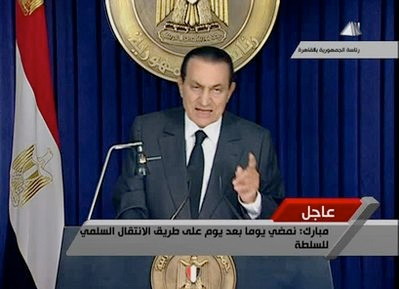
Cairo, February 11, 2011 — There was a time when a byline had to state the place and the date of the story – and it had to be actual. We no longer live in an actual world, but a virtual one. So, here, in Newton, Massachusetts, in the late evening hours of February 10, 2011, I can genuinely mark this dispatch as Cairo, February, 11, 2011.
By the grace of CNN and Aljazeerah we have all heard by now that the President of Egypt, Hosni Mubarak, addressed the nation. We even heard some of his words delivered in Arabic. But there was also the pesky interpretation from Arabic to English that was rendered by some interpreter, often falling behind in the speech and providing what best comes to his/her mind at the time. I know this happens a lot, as I am in one of my very many professions an interpreter. Unlike a translator who has the luxury of cozying up leisurely to a text that he/she has to translate, an interpreter on the other hand is under real-time pressure and context, especially if the rendition is done as a simultaneous interpretation. There is a lot that gets lost. Therefore, I was not surprised this evening to hear the Egyptian ambassador to the United States going on CNN and NBC (and perhaps others) to explain what Mubarak had said and he meant to say in his speech to the Egyptian nation.
The U.S. media and protesters in the Tahrir Square wanted to know if Mubarak resigned. The answer is “no.” Mubarak did not say “I hereby resign as President of Egypt.” Instead he said that he had passed on/delegated the powers/authority of the presidency onto the vice president. Blitzer of CNN wanted to know if Mubarak was de jure this or Mr. Suleiman was de facto that. Here is what has happened so far: Mubarak continues to be the head of state. Head-of-state and head-of-government are two different functions. The first one embodies the sovereignty of a country, the second one runs the affairs of the state. In a parliamentary system, this is easily understood: In Britain the Queen is the Head of State, the Prime Minister is the head of government. In hybrid systems – like Egypt – one has a President, and now a Vice-President, and also a Prime Minister.
To better understand the situation, please consider Suleiman as vice-president; nothing more. In the United States, we often misconstrue these distinctions in other systems because of our own system of presidential government – one president, a line of succession, and no prime minister – A congress, not a parliament; no coalition government, one party or other.
Mubarak’s speech kept referring to the situation in Egypt as a crisis. The term crisis means a turning point. And that is all that this to-do has been so far – a crisis. However, the folks down on the Tahrir Square keep talking about a “revolution,” and this is being echoed also by the international press as a revolution, upheaval, uprising.
The difference in the call for reform/change and a revolution is the D word. When the crowds in the Tharir Square ask for Mubarak to resign or leave, they are calling for the presidency to accommodate a new agenda. Beware of the day when the protesters ask for Mubarak’s head – like “Death to Mubarak.” That will be the day when the call for reform becomes a call for revolution. That will be the day when political grievances become suddenly a class conflict – poor versus rich, common man versus elite, proletariat versus bourgeoisie, governed versus governor, and so forth.
If the chants in the streets turn to “Death of Mubarak” then the protesters will march to the presidential palace, where they get to put the despot to death or chase him out of Egypt, which arguably is a moral equivalent of a death sentence.
Mubrak has already indicated that he will not flee, and that he will die on Egyptian soil. That means he will take a few lives before his is taken. Is any Egyptian prepared to walk into fire, to die, so that the dream shall live? I am not talking about accidental or circumstantial loss of life and limb that comes with protests – I am talking about Egyptian protesters willingly wearing the apparel of martyrs – to be willing to die for the cause. Only then one can talk of having a revolution in the making. In the words of Alfred de Vigny, until then only silence is great, all else is weakness (Seul le silence est grand, tout le reste est faiblesse).






